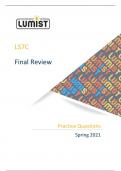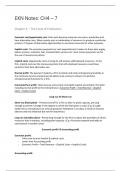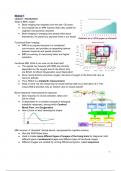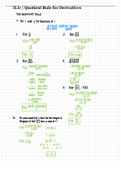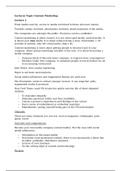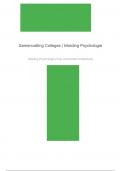CRIMINAL PROCEDURE
INTRODUCTION:
There are two types of criminal procedure systems:
accusatorial (SA) = prosecution and defence (dominos litus – lord of litigation).
Judge does not get involved (he is unbiased and objective as he is not involved in the investigation
– but he might not see/hear all the evidence which is inadmissible for some reason) .
Each party puts on the best case it can and picks on the weaknesses of the
opponent’s case, then the judge decides who wins (but what if you cannot afford a good
lawyer?).
(Malton = suspect arrested and jailed. The police went to where he lived and searched his room, without his permission. They received consent from
the owner of the house. They found incriminating evidence, which later was inadmissible because it was obtained illegally – lack of consent from the
suspect)
inquisitorial (France) = judge questions and leads the case (dominos litus).
The SA government is introducing more inquisitorial elements into our system (eg: s115 of the Criminal
Procedure Act states that the magistrate can ask the accused why he has pled not guilty, even though the accused may remain silent) .
JURISDICTION:
GENERAL:
Section 165(1) of the Constitution = judicial authority is vested in the courts.
Types of courts:
Constitutional court = highest court in all constitutional matters (can strike down legislation).
If the law is illegal, it may be struck down (eg: death penalty).
Supreme Court of Appeal = highest court of appeal on any matter other than constitutional issues
(s4(1) of the Supreme Court Act 59 of 1959).
In practice, appeals are heard by 3 judges.
Minister of Justice can ask the SCA to decide issues of law.
High courts = provincial and local divisions (s4 of the Supreme Court Act and s1 of the Criminal Procedure Act ).
Magistrates courts = district (smaller) and regional (larger).
All magistrate court decisions may be appealed to their provincial high court
divisions (WLD is an exception – can appeal to it even though it is a local court) – but require a
leave to appeal (s309 of the Crim Pro Act).
(1) MATTER of Jurisdiction:
District Magistrates Court = can hear all crimes except:
treason
murder
rape (can hear attempted rape as it is a different crime)
Regional Magistrates Court = can hear all crimes except treason (s89 of the Mag Court Act).
High Court = can hear all crimes (has inherent/original jurisdiction – no statute specifying what it can hear).
SCA = can only hear appeals (not a court of first instance).
(S v. Zuma = applicant challenged a section of the Criminal Procedure Act which provided that if you confessed in front of a magistrate, it was
presumed that you did so freely and voluntarily – the onus is on you to prove otherwise. The parties agree that the local high court would hear the
matter, but the high court claimed that it was a constitutional matter, and therefore must be heard by the CC.
The CC held that high courts have constitutional jurisdiction – must hear the matter first, and only then can refer it to the CC)
(S v. M = district magistrates courts cannot hear rape cases. However, the court held that they can hear attempted rape cases, as attempted rape is a
totally separate and different crime, and since it is not specifically excluded in the Magistrates Court Act, there is nothing stopping them from being
able to hear such cases)
(2) TERRITORY of Jurisdiction:
, District/regional Magistrates Court = all crimes committed in their area (s90 of Mag Court Act) – and certain
exceptions, if the crime was committed:
within 4km of the area;
on a journey in a vehicle and passed through the area (or within
4km of the area);
on a boat on a river and passed through the area (or within 4km
of the area);
in territorial waters of SA – the district/region nearest may
hear the case;
begun in the district/region.
SA courts do not have jurisdiction over crimes committed on foreign soil (even if 4km away) – but there are
statutory exceptions:
Aviation Act =
Civil Aviation Act = can hear a crime committed on an airplane if the:
accused is an SA citizen
plane was in SA airspace
plane is SA
plane is owned by an SA citizen
Special provision – hijacker of a plane can be tried anywhere.
Merchant Shipping Act = can hear a crime committed on a ship if the:
accused is an SA citizen
ship is SA
Special provision – a pirate can be tried in any state.
Section 90 of the Magistrates Court Act = if several courts have jurisdiction, any one of them can hear the
case.
Treason = usually committed outside of the country, but tried inside.
Theft = continuing crime, and therefore the court wherever the accused goes will have jurisdiction.
Section 111 of the Crim Pro Act = the National Director of Public Prosecution can order that a trial be held
in a specific jurisdiction.
(S v. Makhutla = accuseds committed robbery close to SA borders, in Lesotho. The stolen goods were taken across, into our border, to Bloemfontein.
They were tried in SA for robbery. The defence argued extraterritoriality principles – offence not committed on SA soil, therefore cannot be tried in SA.
The magistrates court dismissed this argument and, on a competent verdict (can be found guilty for a crime under the main charge, eg: theft under
robbery), found the accuseds guilty of theft. However, the high court overturned this verdict – holding that:
there was no evidence that robbery is a crime in Lesotho
no evidence that a robbery was actually committed)
(S v. Kruger = same facts. The court confirmed the extraterritoriality principle. However, it held that in “bringing-in” cases (stolen goods brought into the
country), according to SA law, if the theft is committed in a foreign country, since it is a continuing crime, the perpetrator can be found guilty under the
SA law of committing theft in SA – don’t apply foreign law of theft)
(R v. Moshesh = accused sent 8 parcels by rail from Bosothu. He received all 8, but the delivery slip reflected only 6 of the parcels. He therefore
claimed from his insurance for the 2 parcels which he claimed were missing – he sent the letter to Bosothu. He was tried in SA and found not guilty of
fraud, as the court held that the misrepresentation only occurred at the opening of the letter, in Bosothu)
(R v. Holm: R v. Pienaar = accuseds went to an enemy country and broadcast propaganda into SA. They were charged in SA with treason. The
accuseds argued that they committed the offence outside of SA – and therefore the court had no jurisdiction. The court held that the broadcast
agitated the air particles in SA, therefore treason was committed in SA. But treason is a special case, as it is almost always committed outside the
country)
(R v. Masupe = Zimbabwean case. The accused broke into a house in a foreign country and brought the property into Zimbabwe. The Zimbabwean
court held that it could not try him for house breaking, but can for theft (continuing crime)
(S v. Maseki = accused charged with possession of stolen property. The court confirmed that any offence can only be heard by the court in the area
where such offence was committed.
, Beer stolen in Pretoria and taken across the border into Botswana. There was not enough evidence to prove theft, but there was enough to prove
possession of stolen property (suspect that the property is stolen, and have no good reason for possessing it). The case could not be tried in SA as
the offence was committed in a foreign country)
(3) SENTENCE of Jurisdiction:
Governed by precedent (previous cases).
District Magistrates Court = max 3 years or R60 000 in fine.
But some statutes extend this maximum.
Can give periodical imprisonment of max 2 000 hours.
Regional Magistrates Court = max 15 years or R300 000 in fine.
Minimum Sentence Act extends this max in certain circumstances.
High court = no limit, but follows precedent.
SCA = limited to the sentence jurisdiction of the original court.
(S v. Makwanyane = courts no longer has the jurisdiction to give the death penalty)
AUTHORITY TO PROSECUTE:
(1) PUBLIC PROSECUTION:
Used to be a right to private vengeance, as no authority to punish on your behalf.
Now we surrender this right to the state – contractual duty to society.
Section 179 of the Constitution created the National Prosecuting Authority (NPA):
Single independent prosecuting authority.
Headed by the national director of public prosecution (NDPP) appointed by the president (all other
official appointed under the NPA Act).
NDPP has the power to institute criminal proceedings on behalf of the state and determine (in
consultation with his deputies) public prosecution policy (determines who will be prosecuted).
National legislation must be enacted to give effect to this NPA and NDPP – the National
Prosecuting Authority Act 32 of 1998.
Such legislation must ensure that the NPA exercises its powers/functions without fear, favour
or prejudice (guarantees the independence of the NPA – as suggested in the Certification case).
Prior to the Constitution, there were 6 national prosecuting authorities, led by attorney generals.
The NPA Act repealed the Attorney-General Act.
Section 6 of the NPA Act = hierarchy in the NPA:
national director of public prosecution
deputy national directors of public prosecution (four for four provinces)
directors of public prosecution (one in every high court)
prosecutors (derive authority from the NDPP who delegates his powers to him)
special prosecutors (section 38 – have special expertise)
Section 12 = qualifications for officers:
NDPP must be:
admitted attorney (can appear in any court)
fit and proper
SA citizen
NDPP holds office for a non-renewable period of 10 years and cannot be older than
65 years.
President has the power to suspend him, pending a fitness inquiry for:
misconduct
ill-health
incapacity
not fit and proper
The president must report a decision to fire him to the parliament within 14 days, and
then parliament, within 30 days, must either confirm or set aside this decision.
If the president is unable to fire him, parliament can do so by a vote.
The Minister of Justice is responsible for the NPA (not control) – cannot tell it what to do, but rather deals
with the budget, salaries, etc…
NDPP must file a report every June with the Minister.
INTRODUCTION:
There are two types of criminal procedure systems:
accusatorial (SA) = prosecution and defence (dominos litus – lord of litigation).
Judge does not get involved (he is unbiased and objective as he is not involved in the investigation
– but he might not see/hear all the evidence which is inadmissible for some reason) .
Each party puts on the best case it can and picks on the weaknesses of the
opponent’s case, then the judge decides who wins (but what if you cannot afford a good
lawyer?).
(Malton = suspect arrested and jailed. The police went to where he lived and searched his room, without his permission. They received consent from
the owner of the house. They found incriminating evidence, which later was inadmissible because it was obtained illegally – lack of consent from the
suspect)
inquisitorial (France) = judge questions and leads the case (dominos litus).
The SA government is introducing more inquisitorial elements into our system (eg: s115 of the Criminal
Procedure Act states that the magistrate can ask the accused why he has pled not guilty, even though the accused may remain silent) .
JURISDICTION:
GENERAL:
Section 165(1) of the Constitution = judicial authority is vested in the courts.
Types of courts:
Constitutional court = highest court in all constitutional matters (can strike down legislation).
If the law is illegal, it may be struck down (eg: death penalty).
Supreme Court of Appeal = highest court of appeal on any matter other than constitutional issues
(s4(1) of the Supreme Court Act 59 of 1959).
In practice, appeals are heard by 3 judges.
Minister of Justice can ask the SCA to decide issues of law.
High courts = provincial and local divisions (s4 of the Supreme Court Act and s1 of the Criminal Procedure Act ).
Magistrates courts = district (smaller) and regional (larger).
All magistrate court decisions may be appealed to their provincial high court
divisions (WLD is an exception – can appeal to it even though it is a local court) – but require a
leave to appeal (s309 of the Crim Pro Act).
(1) MATTER of Jurisdiction:
District Magistrates Court = can hear all crimes except:
treason
murder
rape (can hear attempted rape as it is a different crime)
Regional Magistrates Court = can hear all crimes except treason (s89 of the Mag Court Act).
High Court = can hear all crimes (has inherent/original jurisdiction – no statute specifying what it can hear).
SCA = can only hear appeals (not a court of first instance).
(S v. Zuma = applicant challenged a section of the Criminal Procedure Act which provided that if you confessed in front of a magistrate, it was
presumed that you did so freely and voluntarily – the onus is on you to prove otherwise. The parties agree that the local high court would hear the
matter, but the high court claimed that it was a constitutional matter, and therefore must be heard by the CC.
The CC held that high courts have constitutional jurisdiction – must hear the matter first, and only then can refer it to the CC)
(S v. M = district magistrates courts cannot hear rape cases. However, the court held that they can hear attempted rape cases, as attempted rape is a
totally separate and different crime, and since it is not specifically excluded in the Magistrates Court Act, there is nothing stopping them from being
able to hear such cases)
(2) TERRITORY of Jurisdiction:
, District/regional Magistrates Court = all crimes committed in their area (s90 of Mag Court Act) – and certain
exceptions, if the crime was committed:
within 4km of the area;
on a journey in a vehicle and passed through the area (or within
4km of the area);
on a boat on a river and passed through the area (or within 4km
of the area);
in territorial waters of SA – the district/region nearest may
hear the case;
begun in the district/region.
SA courts do not have jurisdiction over crimes committed on foreign soil (even if 4km away) – but there are
statutory exceptions:
Aviation Act =
Civil Aviation Act = can hear a crime committed on an airplane if the:
accused is an SA citizen
plane was in SA airspace
plane is SA
plane is owned by an SA citizen
Special provision – hijacker of a plane can be tried anywhere.
Merchant Shipping Act = can hear a crime committed on a ship if the:
accused is an SA citizen
ship is SA
Special provision – a pirate can be tried in any state.
Section 90 of the Magistrates Court Act = if several courts have jurisdiction, any one of them can hear the
case.
Treason = usually committed outside of the country, but tried inside.
Theft = continuing crime, and therefore the court wherever the accused goes will have jurisdiction.
Section 111 of the Crim Pro Act = the National Director of Public Prosecution can order that a trial be held
in a specific jurisdiction.
(S v. Makhutla = accuseds committed robbery close to SA borders, in Lesotho. The stolen goods were taken across, into our border, to Bloemfontein.
They were tried in SA for robbery. The defence argued extraterritoriality principles – offence not committed on SA soil, therefore cannot be tried in SA.
The magistrates court dismissed this argument and, on a competent verdict (can be found guilty for a crime under the main charge, eg: theft under
robbery), found the accuseds guilty of theft. However, the high court overturned this verdict – holding that:
there was no evidence that robbery is a crime in Lesotho
no evidence that a robbery was actually committed)
(S v. Kruger = same facts. The court confirmed the extraterritoriality principle. However, it held that in “bringing-in” cases (stolen goods brought into the
country), according to SA law, if the theft is committed in a foreign country, since it is a continuing crime, the perpetrator can be found guilty under the
SA law of committing theft in SA – don’t apply foreign law of theft)
(R v. Moshesh = accused sent 8 parcels by rail from Bosothu. He received all 8, but the delivery slip reflected only 6 of the parcels. He therefore
claimed from his insurance for the 2 parcels which he claimed were missing – he sent the letter to Bosothu. He was tried in SA and found not guilty of
fraud, as the court held that the misrepresentation only occurred at the opening of the letter, in Bosothu)
(R v. Holm: R v. Pienaar = accuseds went to an enemy country and broadcast propaganda into SA. They were charged in SA with treason. The
accuseds argued that they committed the offence outside of SA – and therefore the court had no jurisdiction. The court held that the broadcast
agitated the air particles in SA, therefore treason was committed in SA. But treason is a special case, as it is almost always committed outside the
country)
(R v. Masupe = Zimbabwean case. The accused broke into a house in a foreign country and brought the property into Zimbabwe. The Zimbabwean
court held that it could not try him for house breaking, but can for theft (continuing crime)
(S v. Maseki = accused charged with possession of stolen property. The court confirmed that any offence can only be heard by the court in the area
where such offence was committed.
, Beer stolen in Pretoria and taken across the border into Botswana. There was not enough evidence to prove theft, but there was enough to prove
possession of stolen property (suspect that the property is stolen, and have no good reason for possessing it). The case could not be tried in SA as
the offence was committed in a foreign country)
(3) SENTENCE of Jurisdiction:
Governed by precedent (previous cases).
District Magistrates Court = max 3 years or R60 000 in fine.
But some statutes extend this maximum.
Can give periodical imprisonment of max 2 000 hours.
Regional Magistrates Court = max 15 years or R300 000 in fine.
Minimum Sentence Act extends this max in certain circumstances.
High court = no limit, but follows precedent.
SCA = limited to the sentence jurisdiction of the original court.
(S v. Makwanyane = courts no longer has the jurisdiction to give the death penalty)
AUTHORITY TO PROSECUTE:
(1) PUBLIC PROSECUTION:
Used to be a right to private vengeance, as no authority to punish on your behalf.
Now we surrender this right to the state – contractual duty to society.
Section 179 of the Constitution created the National Prosecuting Authority (NPA):
Single independent prosecuting authority.
Headed by the national director of public prosecution (NDPP) appointed by the president (all other
official appointed under the NPA Act).
NDPP has the power to institute criminal proceedings on behalf of the state and determine (in
consultation with his deputies) public prosecution policy (determines who will be prosecuted).
National legislation must be enacted to give effect to this NPA and NDPP – the National
Prosecuting Authority Act 32 of 1998.
Such legislation must ensure that the NPA exercises its powers/functions without fear, favour
or prejudice (guarantees the independence of the NPA – as suggested in the Certification case).
Prior to the Constitution, there were 6 national prosecuting authorities, led by attorney generals.
The NPA Act repealed the Attorney-General Act.
Section 6 of the NPA Act = hierarchy in the NPA:
national director of public prosecution
deputy national directors of public prosecution (four for four provinces)
directors of public prosecution (one in every high court)
prosecutors (derive authority from the NDPP who delegates his powers to him)
special prosecutors (section 38 – have special expertise)
Section 12 = qualifications for officers:
NDPP must be:
admitted attorney (can appear in any court)
fit and proper
SA citizen
NDPP holds office for a non-renewable period of 10 years and cannot be older than
65 years.
President has the power to suspend him, pending a fitness inquiry for:
misconduct
ill-health
incapacity
not fit and proper
The president must report a decision to fire him to the parliament within 14 days, and
then parliament, within 30 days, must either confirm or set aside this decision.
If the president is unable to fire him, parliament can do so by a vote.
The Minister of Justice is responsible for the NPA (not control) – cannot tell it what to do, but rather deals
with the budget, salaries, etc…
NDPP must file a report every June with the Minister.

